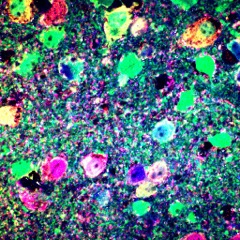Neuroplasticity during healthy ageing and ageing-related diseases
 We are interested in how the brain changes during healthy ageing and in the context of ageing-related diseases. We use a combination of mechanistic laboratory work and population studies to examine risk factors for healthy ageing.
We are interested in how the brain changes during healthy ageing and in the context of ageing-related diseases. We use a combination of mechanistic laboratory work and population studies to examine risk factors for healthy ageing.
We have worked together with the United Nations Population Fund in Bosnia and Herzegovina, Moldova and several others countries across the Eastern Europe and Central Asia region to examine risk factors for healthy ageing in the brain. Our recent work has focused on the importance of social interactions and identified key risk factors for loneliness across the older population in Eastern Europe and Central Asia, including a lack of support for day-to-day tasks for older people, mental health, and social confidence. Our work focuses on gender differences during ageing and how women are differentially affected. This work has been featured in several countries’ strategies for Healthy Ageing and we are working to develop interventions to help reduce loneliness in this cohort (see Keck, 2020; Keck, 2022).
We also do complementary mechanistic work examining the role of neuroplasticity in the adult and ageing brain in health and disease. We use a combination of functional and structural imaging to determine the synaptic and cellular changes to both excitatory and inhibitory cells that follow changes to the input to the brain or the behaviour of the animal. We are interested in the spatial scales of plasticity and how activity is modulated at the level of individual synapses, dendritic branches, cells and networks of cells, as well as the functional consequences of this modulation for the network and behavior. We examine the role of plasticity in healthy adult brains, as well as during neurodegenerative diseases associated with ageing, particularly dementia and Alzheimer’s Disease (see Barnes et al., 2015; Barnes et al., 2017; Barnes et al, 2022). We use our knowledge of plasticity mechanisms to then inform our approaches in population studies.